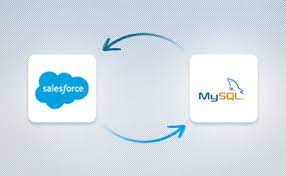Salesforce CRM houses a wealth of customer data, encompassing interactions, leads, and purchase histories. However, without proper organization, these insights risk being lost in the shuffle. Get a handle on data with Salesforce and MySQL.
MySQL, a free, open-source relational database management system (RDBMS) that acts as a digital filing cabinet for structured data, including customer information. Integrating Salesforce CRM with MySQL presents a compelling solution by establishing a seamless bridge between the two systems. This integration enables businesses to efficiently transfer customer data from Salesforce into MySQL, ensuring centralized, accessible, and analyzable data.
Imagine having all customer data neatly organized within a single, searchable database, facilitating holistic insights that empower informed decision-making and personalized marketing campaigns. Let’s explore the significant benefits of integrating Salesforce CRM and MySQL, and how this synergy can revolutionize your business operations.
Benefits of Integrating Salesforce CRM and MySQL
- Centralized Data Storage: Consolidate customer data into a centralized MySQL database, simplifying management and ensuring data consistency across your organization.
- Detailed Analytics: Leverage MySQL’s capabilities to perform in-depth analytics and reporting on Salesforce data, facilitating data-driven decision-making and strategic planning.
- Real-Time Synchronization: Maintain up-to-date information across systems with real-time synchronization, ensuring that changes made in Salesforce are promptly reflected in MySQL and vice versa.
- Personalized Marketing: Access comprehensive customer profiles stored in MySQL, enabling targeted and personalized marketing efforts based on accurate data insights.
- Scalability and Flexibility: MySQL’s scalability allows businesses to handle growing volumes of data effortlessly, adapting to evolving business needs without compromising performance.
- Cost-Effective Management: As an open-source solution, MySQL offers cost-effective data management and maintenance, reducing overhead costs associated with proprietary database systems.
How to Integrate Salesforce CRM and MySQL
Integrating Salesforce CRM with MySQL involves leveraging Salesforce APIs for secure data communication and synchronization. Here’s a step-by-step approach:
- Generate Salesforce API Credentials:
- Log in to Salesforce and navigate to the Setup menu.
- Access the “App Manager” and create a new “Connected App.”
- Configure OAuth settings to enable API access and generate API credentials (Consumer Key and Consumer Secret).
- Develop Apex Code for Data Extraction:
- Create an Apex class within Salesforce to query and extract Salesforce data using SOAP API.
- Ensure the extracted data format aligns with MySQL requirements, such as transforming data types or structures if necessary.
- Data Transformation Logic (Optional):
- Customize Apex code to transform extracted Salesforce data to fit MySQL table structures, ensuring seamless compatibility during data transfer.
- Load Data into MySQL Using Salesforce Data Loader:
- Download and install Salesforce Data Loader to facilitate data export from Salesforce.
- Export desired Salesforce objects (e.g., Accounts, Contacts) to CSV files containing relevant data fields.
- Import Data into MySQL:
- Use MySQL client tools (e.g., MySQL Workbench, phpMyAdmin) to import CSV files into MySQL databases.
- Map CSV file columns to corresponding MySQL table columns and execute the import process.
- Schedule Data Synchronization (Optional):
- Implement Salesforce Scheduler or similar tools to automate Apex class execution at scheduled intervals, ensuring continuous data synchronization between Salesforce and MySQL.
Common Challenges and Solutions
- Integration Complexity: Seek professional assistance or utilize integration platforms with intuitive interfaces to simplify the setup process.
- Data Transformation: Implement ETL tools or customize mappings to ensure seamless data transformation between SFDC and MySQL.
- Error Handling: Develop robust error-handling mechanisms to manage unexpected errors and ensure data integrity during integration.
- Maintenance Burden: Regularly update integration code to align with Salesforce and MySQL API updates, and automate tests for early issue detection.
- Monitoring and Optimization: Utilize monitoring tools to optimize performance and efficiency, adjusting data mapping configurations as needed.
Conclusion
Integrating Salesforce CRM with MySQL represents a transformative approach to streamline data management and enhance operational efficiency. By combining Salesforce’s robust CRM capabilities with MySQL’s flexible database management, businesses can unlock real-time insights, improve customer engagement, and drive strategic growth initiatives seamlessly. Embrace the power of Salesforce CRM and MySQL integration to stay competitive in today’s data-driven landscape effortlessly.











